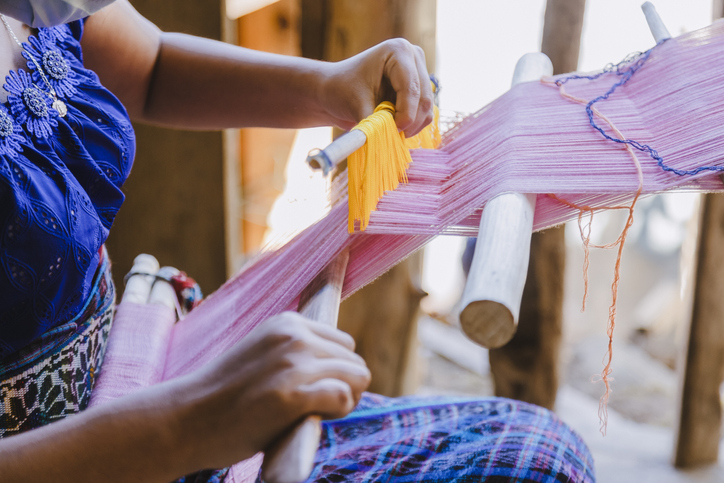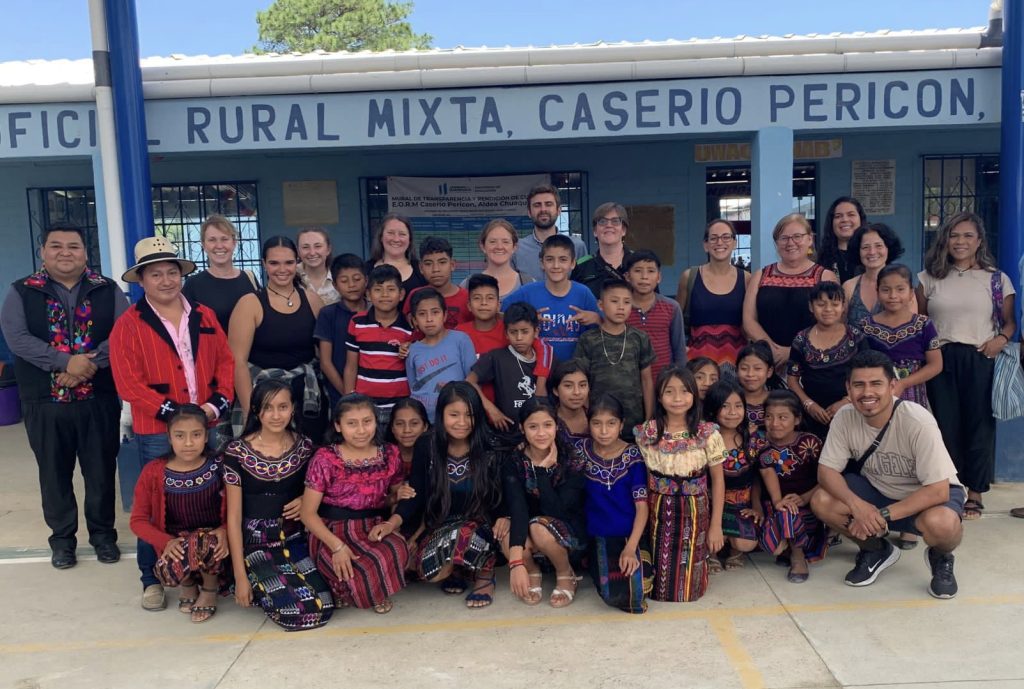
Juan does a double take when I mention Joyabaj. “¿De veras?” he asks. We’d been chatting about my recent trip to Guatemala as he finished up his shift at work. He wondered if I’d gone to the hot spots—Panajachel (Sí, muy hermoso) and Antigua (Esta vez no, pero sí lo conozco). This trip wasn’t really a vacation, I explain, but a chance to visit schools, meet with teachers, and study K’iche. Embarrassingly, I add on Saqarik! Utz wach lal? Maltyox. (“Good morning! How are you? Thank you!”) Non sequiturs, sure, but they are the only K’iche phrases I can call to mind in the moment.
Juan humors me with a hearty laugh. He is bilingual in K’iche and Spanish and is quickly improving in English. (I never fail to be humbled by this multilingualism in Rhode Island that is so prevalent yet so undervalued.) Juan tells me that he has lots of family here who are from Joyabaj. I’m not surprised—many local students come from this small, mountainous pueblo. It was one of the reasons our group of educators had spent July in Guatemala: we wanted to better understand the push/pull factors leading to the persistent migration of young people to the US and to our schools in Providence.
I’m exhausted all over again as I review our 29-day itinerary. Beyond Joyabaj, we spent time in villages throughout Quiche and Quetzaltenango. We explored Mayan ruins in Tak’alik Ab’aj and Q’uma’rkaj; we learned about nahuales and cosmovisión. We attended workshops with ministers of education and with panels of student leaders from their gobiernos escolares. We traveled by pickup to the Colomba market with local mamás, who would buy arroz y frijoles and güisquil y huevos and head back to their village with impossibly heavy baskets balanced atop their heads. We were welcomed into school after school by inspiring students, who would sing and dance in traditional Mayan clothing, and then get right to work in their classrooms. One compañera, Anne, reflected that we were living in the space between saber y conocer, working to deeply know this amazing country, its troubled history, its rich tapestry of culture and languages.
I pause as I look back over the charlas listed throughout our agenda. Loosely translated as “chats,” these were opportunities for us to hear directly from a variety of leaders, to bear witness to stories of individual trials and mad acts of resistance. Charlas were, for me, where the magic happened. There were informal charlas where Doña Josefina told me, over our meal of tortillas y frijoles, how she can’t afford the fees for her oldest daughter to continue school, and where Doña Dolores described how she handles the blaring music from the pop-up Evangelical church next door. Rocael’s group charla introduced us to the surprising surge of the Semilla Party in Guatemala’s deep-rooted political corruption.* Chris’s powerful charla heightened our understanding of the realities surrounding decades of illegal international adoptions from Guatemala. Eduardo, our masterful K’iche teacher, opened our eyes to the painful generational loss of Indigenous languages. Abelino, one of the founders of La Escuela de las Montañas where we were staying, humbly described his work organizing Indigenous farmworkers and establishing this community with houses, electricity, and essential drainage systems. In a crazy coincidence, my sister Jenny had met Abelino when she came to Guatemala in the late 1990s. It’s a small world after all.

Each charla raised new questions for me about borders, about resiliency, about what global citizenship might be. But it was the charla with Don Pedro that broke my heart wide open. Unassuming and soft-spoken, Don Pedro joined us on the front porch of La Escuela one Wednesday afternoon. We had been told that he would share his experiences of being captured and tortured during the civil war, so we were (in theory) prepared to hear difficult details. There is no way to prepare to hear the ways in which a person’s humanity can be stripped from them over and over again. Don Pedro spoke quietly of unimaginable atrocities, from an unprovoked capture in his village to weeks of brutal physical and mental torture. His voice broke when he shared the names of those who were tortured with him and the name of a soldier who was involved in his capture. Lo conocí de mi pueblo. Pedro explained that he knew that the teen from his town had been forced to join the army. He did not blame him; he considered him a victim, too.
The soldiers in charge were convinced that Pedro was involved with the guerilla insurgence. He was not. On what would be his last day of captivity, Pedro sat across from the soldier jefe, who asked him again for the name of his guerilla leader. Pedro, who no longer feared death, looked him in the eye and told him he would rather die with a clear mind than condemn an innocent person. “No conozco a nadie,” he continued. “¿Qué harías si estuvieras en mi lugar? ¿Dime, qué harías tú?” My heart broke again as I listened to Roberto’s tearful translation: “I don’t know anyone. Let me ask you: What would you do if you were me? Tell me, what would you do?” For reasons Pedro could not say, the soldier set him free.
Long after Don Pedro walked away, his question lingered on the porch. It buzzed in with the hummingbird as I lay in the hammock. ¿Y qué harías tú? It pounded with the rains on the metal roof. Tell me, what would you do? I jotted it in the margins of my journal as I reread the others’ stories. What would I do if there were no money for my daughters to go to school? What would I do if they came for my son, if they took away our language? What would I do if money for the pickup and the market just ran out? ¿Dime, qué harías tú? I got together with a few folks from the trip recently, and we were discussing how “re-entry” was going. One friend shared the challenge she was having in conversations, both in trying to express what she had learned and in feeling like the listener was able to understand. I get it. I’m much older and have had some practice at trying to reconcile my re-entry to the US after time in other countries, but this one still feels hard. How do we really honor stories that have been shared with us? How do we convey conflicted feelings of privilege and responsibility as US citizens in an unbalanced world?
As my school-year schedule ramps up, I know the voices from the charlas will begin to fade away. I know that each of us from the trip will strive to integrate what we learned into our work and our daily lives. I am thinking about how I can share some stories with the preservice teachers with whom I work. I am thinking about ways that a charla philosophy can drive our work with local students and families. I am thinking about the magical part of teaching that comes in sitting for a while, in being prepared (in theory) for your heart to be broken wide open.
Saqarik, one of the K’iche words I tested out with Juan, can be translated as buenos días, “good morning.” But I remember how Eduardo had us mesmerized as he explained the deeper meanings, the ways it connects to Mayan beliefs that each day is a clearing, a surprising gift, a new dawn to be cherished. It seems a beautiful way to enter the school year. Let’s clear out the space, make room for our stories, and work together to see how they translate into what’s next. Saqarik, everyone. Saqarik.
*Indigenous communities in Guatemala continue to lead protests calling for the results of the election of anti-corruption president-elect Bernardo Arévalo to be honored and enforced (www.pbs.org/newshour/show/guatemalan-president-elect-arevalo-discusses-effort-to-keep-him-from-taking-office).
Tricia Kelly, EdD, is an educator with over 25 years of experience working in language education, including elementary bilingual teaching, middle school Spanish teaching, and curriculum design and coaching for high school English language development. She is currently a faculty member in the Education Department at Brown University, where she supports preservice teachers in differentiating content for multilingual learners.







